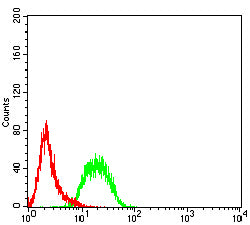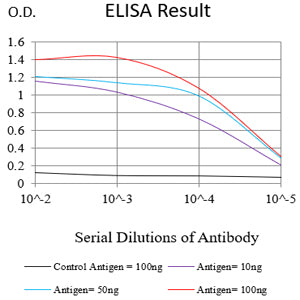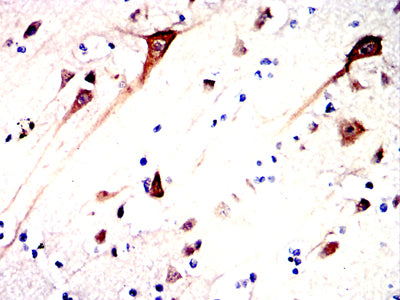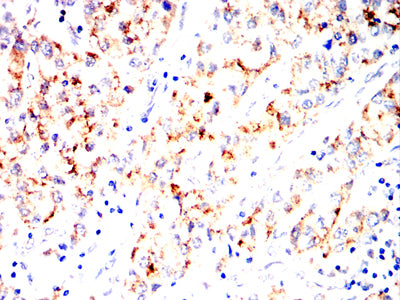



| WB | 咨询技术 | Human,Mouse,Rat |
| IF | 咨询技术 | Human,Mouse,Rat |
| IHC | 1/200 - 1/1000 | Human,Mouse,Rat |
| ICC | 技术咨询 | Human,Mouse,Rat |
| FCM | 1/200 - 1/400 | Human,Mouse,Rat |
| Elisa | 1/10000 | Human,Mouse,Rat |
| Aliases | BYK; Dtk; RSE; Rek; Sky; Tif; Etk-2 |
| Entrez GeneID | 7301 |
| clone | 2F5B8 |
| WB Predicted band size | 96.9kDa |
| Host/Isotype | Mouse IgG1 |
| Antibody Type | Primary antibody |
| Storage | Store at 4°C short term. Aliquot and store at -20°C long term. Avoid freeze/thaw cycles. |
| Species Reactivity | Human |
| Immunogen | Purified recombinant fragment of human TYRO3 (AA: extra 230-429) expressed in mammalian. |
| Formulation | Purified antibody in PBS with 0.05% sodium azide |
+ +
1. **文献名称**: "Targeting TYRO3 inhibits epithelial-mesenchymal transition and improves drug sensitivity in colorectal cancer"
**作者**: Wang Y, et al.
**摘要**: 研究开发了一种抗TYRO3单克隆抗体,证实其通过抑制TYRO3磷酸化阻断EMT进程,增强结直肠癌细胞对化疗药物的敏感性,减少体内转移。
2. **文献名称**: "TYRO3 as a potential therapeutic target in melanoma: antibody-mediated blockade suppresses tumor growth"
**作者**: Brown K, et al.
**摘要**: 利用抗TYRO3抗体阻断TYRO3/AKT信号通路,显著抑制黑色素瘤细胞增殖并诱导凋亡,动物模型显示肿瘤体积减小,提示其临床转化潜力。
3. **文献名称**: "The role of TYRO3 in macrophage polarization and its implications in atherosclerosis"
**作者**: Zhang L, et al.
**摘要**: 通过抗TYRO3抗体干预实验,发现TYRO3促进M2型巨噬细胞极化,加速动脉粥样硬化斑块形成,为心血管疾病治疗提供新靶点。
4. **文献名称**: "A novel anti-TYRO3 antibody-drug conjugate demonstrates efficacy in TYRO3-overexpressing breast cancer models"
**作者**: Patel R, et al.
**摘要**: 研究设计了一种TYRO3抗体-药物偶联物(ADC),在乳腺癌模型中选择性杀伤高表达TYRO3的肿瘤细胞,且对正常组织毒性较低,展现治疗潜力。
TYRO3 antibodies are immunological tools designed to target and study the TYRO3 protein, a receptor tyrosine kinase belonging to the TAM family (TYRO3. AXL, MER). TYRO3 is expressed in various tissues, including the nervous, immune, and reproductive systems, and plays critical roles in cell survival, proliferation, and immune regulation. Structurally, it contains extracellular immunoglobulin-like and fibronectin type III domains, a transmembrane region, and an intracellular kinase domain. Its activation typically occurs via binding to ligands like Gas6 and Protein S, triggering downstream signaling pathways such as PI3K/AKT and MAPK.
Research on TYRO3 antibodies has grown due to the protein’s dual role in health and disease. In normal physiology, TYRO3 contributes to neurodevelopment, platelet aggregation, and phagocytosis. However, dysregulated TYRO3 signaling is implicated in cancer progression (e.g., metastasis, drug resistance), autoimmune disorders, and viral infections (e.g., Zika, Ebola). Antibodies against TYRO3 are utilized to inhibit its oncogenic activity, block ligand-receptor interactions, or detect expression levels in experimental models. They also serve as diagnostic tools to assess TYRO3 overexpression in tumors or as therapeutic candidates in preclinical studies.
Despite their potential, challenges remain, including optimizing antibody specificity and minimizing off-target effects. Current studies focus on developing monoclonal or bispecific antibodies to enhance clinical efficacy. Overall, TYRO3 antibodies represent a promising avenue for understanding TAM receptor biology and advancing targeted therapies.
×